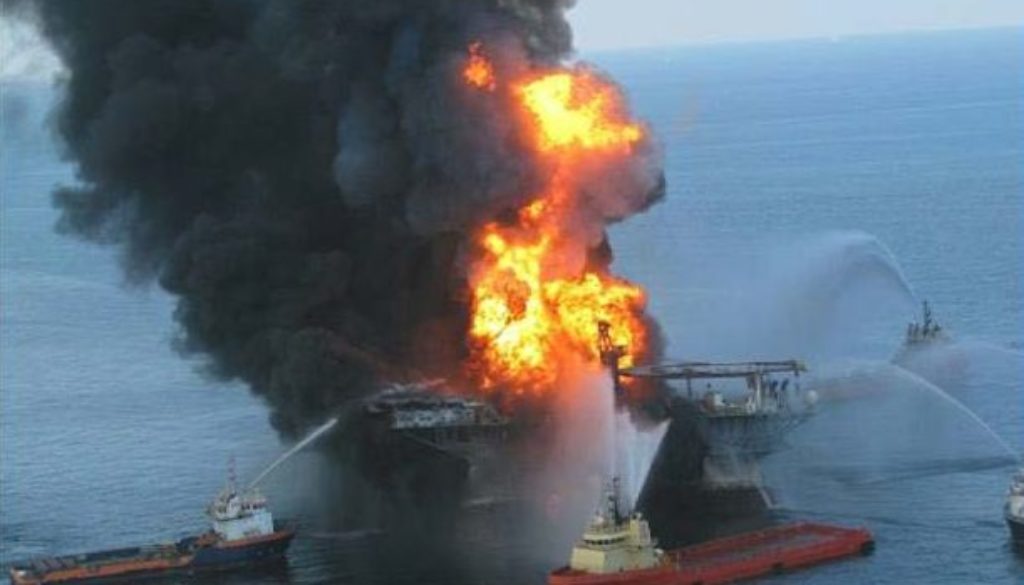I Investigated the Deepwater Horizon Disaster 10 Years Ago. When Will We Learn From Our Mistakes?
By Sam Sankar, Earthjustice
It has been 10 years since BP’s Macondo well blew out on April 20, 2010, claiming 11 lives, creating an underwater volcano of crude oil and destroying not only the Deepwater Horizon oil rig, but also any illusion that the oil industry can be trusted with our nation’s natural resources, the public’s health and safety, or our planet’s future. To get a sense of just how flat-footed the accident caught the industry, remember that a full month after the blowout, the best solution its experts could suggest to plug the well was a “junk shot” of golf balls, tires, and other debris. (It didn’t work.)
It took 87 days for them to stop the flow. By then, 200 million gallons of oil had spilled into the Gulf, costing the fishing industry an estimated $1 billion in lost revenue, decimating Gulf Coast tourism, killing untold millions of marine wildlife, and sickening thousands of people.
After leading the technical investigation of the National Commission on the BP Deepwater Horizon Oil Spill, my biggest takeaway was this: nobody was prepared. Why? Because the oil industry had convinced itself that it knew what it was doing. It had bought politicians and hamstrug regulators. It had persuaded a nation that we had to hand over our future if we wanted jobs and prosperity today.
A decade later, we find ourselves in the grip of another catastrophe, and we are suffering again from complacency, poor preparation, and disregard of basic science. In our isolation, it’s worth reflecting on how the nation and the oil industry responded to the Deepwater Horizon disaster — including the ways that response fell short.

After studying the disaster at length, and listening to industry experts, scientists, and Gulf communities, the bipartisan Oil Spill Commission made a series of modest recommendations to improve oversight and management of drilling in federal waters. It all boiled down to three things.
First, we need to set high regulatory standards for companies that want to drill in the Gulf, and we need to enforce them. We also need to be ready for the next giant blowout, because it will happen. If another deepwater well were to blow out tomorrow in the Gulf, I know of no entity, public or private, that we could trust to quickly and reliably cap it, collect millions of gallons of spilled oil, or manage and restore damage to the region’s fisheries.
Second, we must do a much better job of understanding the impacts of the oil industry on the people and environment of the Gulf of Mexico — and balancing those impacts with the needs of other industries that rely on the Gulf.

And third, we have to make sure that when things do go wrong, we have the resources to fix the damage. Currently, our laws limit the liability that oil companies face for the spills they cause. Industry argues that without those laws, companies won’t be able to afford to insure their activities. But that approach effectively forces the American taxpayers, especially the people of the Gulf region, to accept the risks of industry self-regulation.
Ten years later, few of our recommendations have been adopted. There were bright spots, like the Obama administration’s Well Control and Blowout Preventer Rule. But overall, things have actually gotten worse since the Deepwater Horizon disaster. The Trump administration’s heedless “America First” energy policy has put oil industry interests first, ahead of our national interest. The administration is auctioning off our public lands and waters and shredding regulations as fast and far as our laws will allow (and faster, when nobody is looking). The head of the Bureau of Safety and Environmental Enforcement, Scott Angelle, is a former oil industry lobbyist who muzzled his own safety regulators when they raised red flags about some of the proposed rollbacks.
As a result, oil companies are still playing with bombs they don’t know how to defuse. And when things go wrong, it’s still American taxpayers who will be forced to deal with the fallout.

Consider, by contrast, our approach to auto safety. Even as the number of people driving has soared in recent decades, the number of vehicular deaths has plummeted. Why? Because the federal government — despite fierce industry opposition — required auto manufacturers to install safety systems like antilock brakes that reduce the number of accidents, and devices like airbags that minimize injuries when accidents do occur. Almost every state requires drivers to carry insurance, and high-risk drivers have to pay more to get it.
By contrast, 10 years after the worst environmental disaster in our nation’s history, we still do not fully understand the risks and the damage the oil industry creates in the Gulf, let alone demand that the industry reliably control those risks. So we, America’s taxpayers, still serve as the industry’s insurance policy.
We must do better. This administration has already shown us what it looks like when we ignore scientists, dismiss safety and health experts, and fail to prepare for disaster. People all over the country are scared, sick, and hurting. The lessons of the Deepwater Horizon disaster still resonate ten years later. It’s not too late to heed them.

